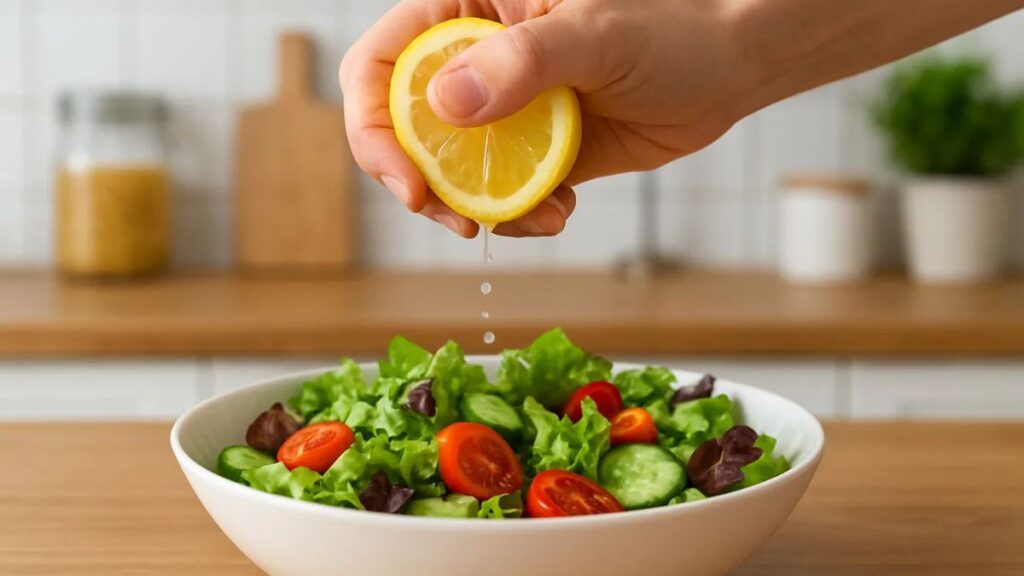What Happens When You Add Lemon To Salads Every Day

A simple squeeze of lemon can do more than just make your salad taste zesty. While we often rely on olive oil, yoghurt, or herbs to dress up salads, lemon is an ingredient that’s easily overlooked. Yet, this humble citrus fruit offers much more than just tanginess, it can actually boost the flavour and improve the health benefits of your salad. Adding lemon every day can give your meals a refreshing twist while helping your body in multiple ways.
Why Lemon Should Be in Every Salad
Lemon not only enhances the taste but also plays an important role in improving your health. Packed with vitamin C and other nutrients, it can support immunity, digestion, hydration, and even weight loss. Here’s how a daily dose of lemon can benefit you:
1. Boosts Immunity
Lemons are rich in vitamin C, which is essential for fighting infections. According to a 2024 study, regular consumption of lemon can help ward off seasonal colds and keep your energy levels stable throughout the day.
2. Aids Digestion
Lemon juice stimulates digestive juices, making it easier for your stomach to break down food. It can reduce bloating and improve gut health when consumed consistently.
3. Supports Weight Loss
Low in calories but high in flavour, lemon is a great addition to weight-loss diets. A 2008 research paper showed that the natural compounds in lemon can promote a feeling of fullness and reduce unnecessary snacking.
4. Keeps You Hydrated
Adding lemon to water or meals can encourage you to drink more fluids, thanks to its refreshing taste. Staying hydrated helps with metabolism, skin health, and maintaining overall energy.
5. Detoxifies Naturally
Lemon is rich in antioxidants that support the body’s detox process. It helps flush out toxins, promotes clearer skin, and contributes to overall well-being.
Improves Iron Absorption
One of the biggest reasons to add lemon to your salad is its role in nutrient absorption. A 2020 study found that vitamin C from lemon helps increase iron bioavailability in the body. Iron-heavy vegetables like spinach or kale can be better absorbed when paired with a squeeze of lemon. A 2023 publication explains that vitamin C helps capture non-heme iron, making it easier for your body to use. This is why experts recommend pairing leafy greens with lemon.
A Natural Flavour Enhancer
Beyond its nutritional value, lemon’s acidity brings out the crisp, fresh taste of vegetables. It brightens the flavours without the need for calorie-rich dressings. A little lemon can make your salad vibrant and refreshing.
Salads That Taste Better With Lemon
Some salads truly come alive when dressed with lemon juice:
- Greek Salad: Tomatoes, cucumber, feta, and olives feel incomplete without a hint of lemon.
- Quinoa or Chickpea Salads: A layer of lemon juice adds freshness and zing.
- Fruit Salads: Lemon prevents fruits like apples and bananas from browning while enhancing their flavour.
For a quick and healthy option, drizzle lemon over cucumber and tomato salad, it’s light, refreshing, and ready in minutes.
Lemon vs Vinegar: Which Works Best?
Both lemon and vinegar are common salad dressings, but they serve slightly different roles:
- Lemon adds a brighter, fresher acidity and comes with vitamin C benefits.
- Vinegar brings deeper sharpness and sometimes sweetness depending on the variety.
If your focus is on nutrition and hydration, lemon is usually the better choice. But if you want a stronger flavour, vinegar has its place. Some chefs even combine both for a balanced and tasty dressing.
When Not to Overdo It
While lemon is beneficial, too much of it can overpower the dish. Creamy dressings made from yoghurt, tahini, or avocado can turn sour if too much lemon is added. Similarly, delicate ingredients like soft cheeses or fruits may lose their natural flavour. The rule is simple, a light squeeze is all you need to lift the dish without masking its taste.
How to Get More Juice Out of a Lemon
Here are some quick tricks to make the most of your lemons:
- Roll It On The Counter: Press and roll the lemon before cutting to break down its membranes.
- Warm It Slightly: Soak in warm water or microwave for 15 seconds to release more juice.
- Cut It Lengthwise: This exposes more pulp for easier squeezing.
- Use A Fork While Juicing: Twist a fork into the lemon while squeezing for maximum extraction.
- Choose Ripe Lemons: Soft, heavy lemons yield more juice than hard ones.
How to Choose Juicy Lemons Every Time
To pick the best lemons, look out for:
- Weight: Heavier lemons for their size are juicier.
- Skin Texture: Smooth, thin skin means more flesh.
- Colour: Bright yellow indicates ripeness.
- Firmness: Slightly soft under pressure is best.
- Aroma: A fresh citrus smell is a sign of a juicy lemon.
How to Keep Lemons Fresh for Longer
Here are some storage tips to make your lemons last:
- Store in the fridge: Keeps them fresh longer than at room temperature.
- Use airtight bags: Prevent moisture loss.
- Wrap cut lemons: Keep them covered to avoid drying.
- Freeze lemon juice: Store in ice trays for later use.
- Preserve with salt: A pinch of salt slows spoilage.
How Much Lemon Is Safe to Eat Daily?
Experts recommend consuming two to three lemons a day, which equals about four to six tablespoons of juice. However, moderation is key. A study in The Pan African Medical Journal warned that excessive lemon intake can erode tooth enamel, cause sensitivity, and harm oral health.
Final Thoughts
Lemons are more than a garnish, they’re a powerhouse of flavour and health benefits. From boosting immunity and aiding digestion to improving iron absorption and keeping you hydrated, a squeeze of lemon makes your salad both tastier and healthier. So next time you prepare a salad, don’t forget that little burst of sunshine!
Disclaimer:
This article is for informational purposes only and not a substitute for medical advice. Consult a doctor before making changes to your diet or health routine.










